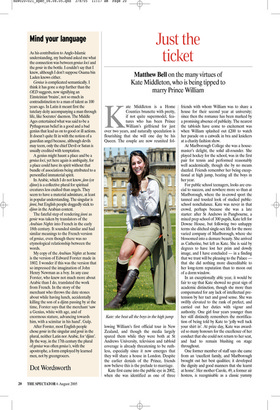Mind your language
As his contribution to Anglo-Islamic understanding, my husband asked me what the connection was between genius loci and the genie in the bottle. I couldn’t say that I knew, although I don’t suppose Osama bin Laden knows either.
Genius is complicated semantically. I think it has gone a step further than the OED suggests, now signifying an Einsteinian ‘brains’, not so much in contradistinction to a man of talent as 100 years ago. In Latin it meant first the tutelary deity accompanying a man through life, like Socrates’ daemon. The Middle Ages entertained what was said to be a Pythagorean belief in a good and a bad genius that lead us on to good or ill actions. It doesn’t quite fit in with the notion of a guardian angel because, although devils may teem, only the chief Devil or Satan is usually credited with temptation.
A genius might haunt a place and be a genius loci, yet here again is ambiguity, for a place could have its spirit without that bundle of associations being attributed to a personified immaterial spirit.
In Arabic, which I do not know, jinn (or djinn) is a collective plural for spiritual creatures less exalted than angels. They seem to have a material admixture, at least in popular understanding. The singular is jinni, but English people doggedly stick to djinn in the Arabian context.
The fateful step of rendering jinni as genie was taken by translators of the Arabian Nights into French in the early 18th century. It sounded similar and had similar meanings to the French version of genius, even though there was no etymological relationship between the words.
My copy of the Arabian Nights at home is the version of Edward Forster made in 1802. I wonder if this was the version that so impressed the imagination of John Henry Newman as a boy. In any case Forster, who knew not much more about Arabic than I do, translated the work from French. In the story of the merchant who throws the date stones about while having lunch, accidentally killing the son of a djinn passing by at the time, Forster says that the merchant ‘saw a Genius, white with age, and of enormous stature, advancing towards him, with a scimitar in his hand’. Gulp.
After Forster, most English people chose genie in the singular and genii in the plural, neither Latin nor Arabic, for ‘djinn’. By the way, in the 17th century the plural of genius was often genius’s, with the apostrophe, a form employed by learned men, not by greengrocers.











































 Previous page
Previous page